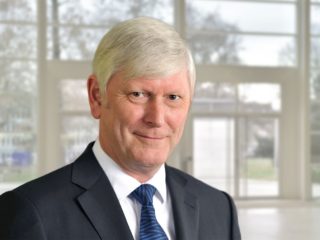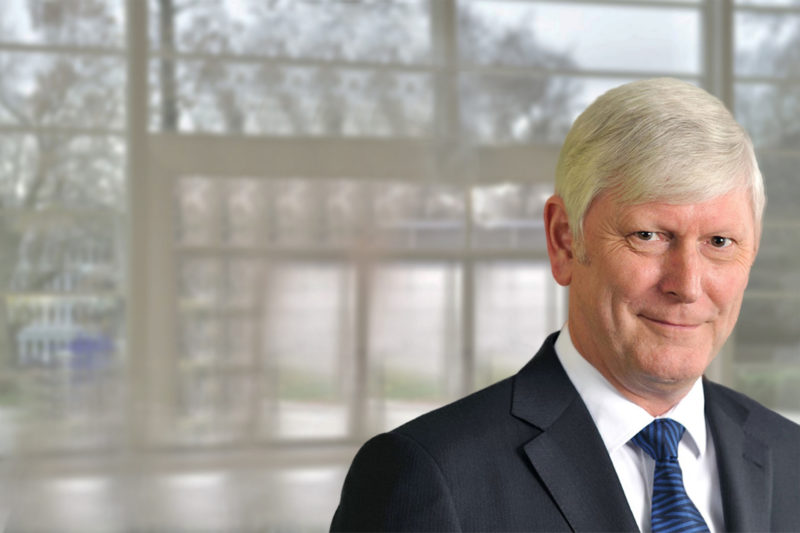
“The European model of a liberal society and free trade is at stake”, writes Dr. Rolf Martin Schmitz, CEO RWE AG, in his essay to our article series “Europe can do better. How our continent finds new strength. A wake-up call from economy” which was initiated by Handelsblatt and United Europe: “Only a unified and strong EU can guarantee a safe future for its economy.”
My heart beats for the European Union. It was and continues to be the right answer to war and destruction. The fact that, 74 years after the Second World War, most Europeans deem peace and prosperity a matter of course is their greatest accomplishment. What is of equal importance in my mind is that the EU is also – and above all – the right answer to the challenges of the future.
Europe always succeeds best where there are a lot of overlaps, where people act as a group or cooperate closely with one another. This is readily apparent at RWE, the company that I run. So far, RWE has been active primarily in Germany, the United Kingdom and the Netherlands. From 2020 onwards – once we have combined the renewable energy operations of E.ON and innogy within our organisation – this will be a good basis from which to step up business with foreign partners in other parts of the world. This is nothing that I’m afraid of. Much to the contrary, our international teams cooperate wonderfully. Opposites don’t necessarily have to divide, as they can complement each other very well. This results in far more than a job well done. On top of that, people take an interest in one another, get to know each other, and learn to appreciate each other. This breeds togetherness, respect and understanding for many a country’s unique characteristics. This often goes far beyond the professional realm. And it is a great means for combatting intolerance.
This is precisely what the European spirit embodies. Working together instead of against each other, respect instead of repulsion. This is the free, open-minded and unified Europe that I champion. It is now up to us all, who can make themselves heard in favour of Europe. Doomsday proclaimers and populists are ubiquitous. They are fighting against a shared European consciousness and are preaching national isolationism – unfortunately with success in some cases. Brexit is demonstrating how quickly majorities against the European spirit can emerge. This is the unmistakable symptom of recurrent nationalistic mindsets. It is changing our world for the worse.
This is clearly shown by the following example. Those who read about trade wars have retrained their focus on daily newspapers and away from history books. This appals me. Because our model of a liberal society and free trade is at stake. Left alone, Germany is too small to successfully represent our view on justice and freedom vis-à-vis China, the USA or Russia. This can only be accomplished by a unified Europe, with 500 million Europeans standing together. This can only be guaranteed by the European Union. Strengthening it is the top priority.
It goes without saying that the EU has its shortcomings – there’s no question about that. It is often too ponderous and bureaucratic to my liking as well. Regulations often go too far and not all of the compromises reached at the EU level cause me to break out in spontaneous excitement. But nevertheless, to me, the EU is the best system I could ever imagine for Europe. We should improve wherever we can – both responsibly and from the inside out.
Europe must continue to grow together wherever possible and expedient. Potential abounds. Energy is a good example of this. There are numerous ways to spin a much tighter European electricity supply network. A grid that is reliable, affordable and has as small a carbon footprint as possible. Europe is still a far cry from such an integrated network. Unfortunately, most EU member states still take a national view on the energy mix. France continues to place its chips on nuclear, Poland is betting on coal, and Germany is focussing primarily on renewables. Our power grid is also mostly confined by national borders. What we have instead of a fine-tuned orchestra is a bunch of uncoordinated soloists. It is obvious that the result is dissonant instead of harmonious, expensive instead of effective.
The energy sector in particular would benefit greatly from a much stronger European orientation. Therefore, over 50 associations and energy companies from the whole of Europe have already signed the Vision of the European Electricity Industry. In this document, in light of the Paris Climate Agreement, they make a pledge to a competitive and reliable supply of electricity in Europe that is largely carbon neutral by the middle of the century. This is a good start, which should motivate policymakers to continue pushing for a pan-European accord in the energy sector as well.
A lighthouse has already been established with the introduction of the European Emissions Trading scheme, ETS for short. The system is both simple and good. Emitters of carbon dioxide from electricity production in Europe must purchase certificates to cover this pollution. These are limited in number and will become increasingly scarce on the market from one year to the next. This automatically causes the energy sector to continuously reduce its greenhouse gas emissions and will result in emissions in sectors subject to the ETS to drop by some 87% by 2050. Certificate prices are determined by the market, thereby providing incentives for innovative solutions across the board. This is a system for all of the European Union’s member states.
Companies must draw on their ingenuity to reduce their need for purchasing certificates. In 2017, a total of 550 employees of various national and cultural backgrounds worked on over 320 research and development projects at RWE alone. Applications were filed for no less than 76 inventions. From power production to modern storage technology, they explore virtually anything conceivable in the energy sector. Ideas grow into pilot plants, culminating in cutting-edge technologies that are competitive on an international scale.
For instance, companies such as RWE are working on ways to convert excess wind power to gas and store it, in order to use it to generate electricity later on, independent of the weather. Having joined forces with other companies, RWE has made a decisive refinement to a method for capturing carbon dioxide. As a result, 30 percent less energy is used than by previous techniques when separating high-purity carbon dioxide from flue gas. This is all the more important given that the UN Climate Bureau regards carbon capture as being a major building block en route to achieving worldwide climate neutrality. The carbon dioxide sequestered by this method can be used as a raw material in the chemical industry or stored. Therefore, the climate, consumers and the energy sector all benefit from this equally.
Many people who do not live in one of the member states envy us for being in the European Union. Due to its economic power, legal certainty, social standards and ability to reach compromises, even though – admittedly – this is at times a both very tedious and slow process. I wish for the addition of a further component. Europe must return to becoming a technology leader in future markets. Europe has lost ground to the competition in the Middle East and Americas – especially with regard to digitisation. This is a problem, because European companies have to compete on a global scale. Resolute and in concert in research and development – this is the approach that should thus be given a new, higher priority within the EU. Why? I believe there are three key reasons for this.
First, this is how to gain the technological edge we need to give our products on world markets. Innovative, future-proof companies that can compete at the global level are indispensable to our prosperity.
Second, technological leadership breeds economic power. A strong European economy is the basis for conducting free and open world trade at fair conditions. A strong, united Europe can enforce minimum standards for the production of goods for the European market and employer rights in producing countries. A weak Europe will fail in this regard.
Third, A relentless EU focus on research and development will stabilise the EU from within. Young Europeans in southern Europe are particularly hard hit by unemployment today. Research, development and the associated investments can contribute to turning this scenario into one with forward-looking products, new jobs and prosperity – supplanting this feeling of hopelessness.
This would (finally) return courage and confidence to the forefront of European debates. Self-assuredness and an optimistic outlook would be the consequences of an upturn. It would do the spirit of Europe a lot of good to add an economic dimension to the huge practical advantages such as the single currency and borderless travel.
Whether this materialises is in the hands of us citizens of the European Union. Of course, I will thus vote at the elections to the European Parliament. After all, as a citizen, I am a proponent of Europe, a proponent of the EU. In addition, I would like our children and grandchildren to grow up on a unified continent. Therefore I am voting for the future – and it is pro-Europe.
The article series “Europe can do better” appears in Handelsblatt in German and in German and English on Handelsblatt Online and the website of United Europe until the European Elections. They are also collected in a book which was published on 15 April, 2019 by Herder-Verlag. Please find more information about the book in German here.
About Dr Rolf Martin Schmitz:
Dr Rolf Martin Schmitz, born in Mönchengladbach in 1957, studied engineering at the RWTH Aachen University. After obtaining his doctorate in engineering in 1985, he worked for Steag AG and VEBA AG. From 1998 to 2001, he was a member of the Executive Board of rhenag Rheinische Energie AG. This was followed by board activities for Thüga AG and the takeover of the position as Chairman of the Management Board of E:ON Kraftwerke GmbH. In 2006, he moved to RheinEnergie AG, where he became Chairman of the Executive Board. Dr. Rolf Martin Schmitz has been working for RWE AG since 2009. There he took on various tasks, initially as Chief Operating Officer, from 2010 as Chief Operating Officer and from 2012 as Deputy Chairman of the Executive Board. He has been CEO of RWE AG since October 2016.



